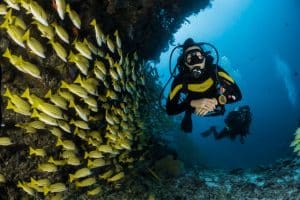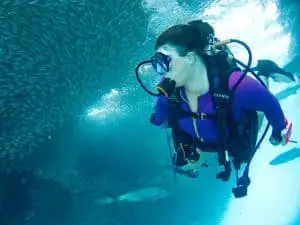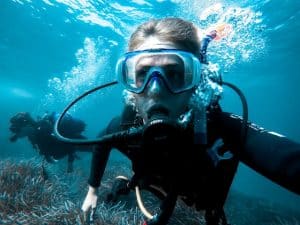When on vacation, it is natural to have a few drinks to unwind. Scuba diving is one of the activities that one may undertake while on vacation, but can you do it while drunk? Believe it or not, this is a popular query.
Diving may be psychologically taxing as well since divers must concentrate on many elements at the same time and be prepared to respond swiftly and efficiently in the event of an emergency. It may be unexpected, and minor issues can quickly compound if a person is not physically and emotionally fit.
Drunk while Diving, is it Possible?

Even when in moderation, alcohol can significantly damage your performance in these areas. Even on the ground, we are all aware that there are health hazards connected with alcohol intake; below, these same dangers are worsened and increased by elements specific to diving, such as the impact of nitrogen at depth. Alcohol has the most devastating impact on divers by seriously weakening their perception and slowing reaction times.
Since alcohol depresses the central nervous system, these consequences and decreased rhythm occur; yet, persons under the impact are frequently ignorant of these limitations. Even if you’ve only had a couple of beers, scuba diving is highly perilous.
Drinking alcohol not only impairs your reaction to circumstances underwater but also worsens a variety of other driving-related dangers. Even though alcohol is sometimes lauded for its warming qualities, the exact reverse is true. It causes the blood arteries in your skin to dilate, increasing blood flow to the skin and far from the center of your system. Drinking increases your risk of hypothermia, which is also a concern for divers because water transfers heat away from the body.
Things to Prevent Before Going Scuba Diving
❕Using Recreational Drugs Before Diving
Dive under the presence of illicit substances is not recommended since the effects may become very unstable underwater, increasing the likelihood of an accident occurring. Even at modest depths, narcosis effects are likely to be strong and unpredictable, resulting in potentially fatal issues with judgment and balance, and coordination. Divers should be informed that psychedelics can remain active in their systems for extended periods after they have been used.
❕Scuba Diving Without a Plan
Depending on your air usage, a diving strategy can be as basic as you and your partner agreeing on the limit dive time, maximum depth, and when and how to stop the dive. Your plan may also include a reminder to tell relatives and friends of where you’ll be diving and when you’ll be returning, so they know what to do in a crisis. Dive plans don’t have to be extensive and complex, but they should be followed, particularly if you’re diving with an independent companion team.
❕Do not Drink Alcohol Before Diving
Diving while under the impact of alcohol is a poor decision. Issues caused by poor judgment or reduced coordination are severe enough on land, but they might be very disastrous underwater. A significant hangover may make even calm waters look difficult, seasickness is more likely, and the day overall unpleasant. If you’ve made an error and are struggling from a hangover, it’s best to pass on the dive.
❕Diving Exhausted
Diving while you’re fatigued or immediately after a long flight might pose safety risks and make the day less enjoyable. Arriving at a place exhausted, thirsty, irritated, and disoriented does not make for safe and fun scuba diving. A good night’s sleep before diving is always important to ensure you’re emotionally and physically prepared to enjoy the dive to the utmost.
❕Do not Disregard the Briefing
Even experienced people should pay attention to the dive briefing while diving in a team. The briefing will include vital safety data, a refresher of diving protocols, and details on sites of interest and possible wildlife sightings. It is critical to recall and understand this key information. It is always worthwhile to take the time to listen and be informed of the dive’s key information to lessen the likelihood of any difficulties or mistakes arising.
❕Consuming a Large Meal
It’s essential to pay attention to the food before diving since a huge meal or improper foods might make you feel ill below or on the dive boat. Avoid hot meals, high-protein foods like steak, acidic fruits that may irritate your stomach, and anything that is very greasy. A balanced lunch was eaten an hour or more before the dive will ensure you have enough energy without feeling bloated or nauseous below.
Things to Prevent After Going Scuba Diving

❌ DO NOT go Flying after the Dive
One of the most well-known concerns to divers is flying after diving. This is a common issue in the diving community since divers want to make the most of their diving excursions and get as much diving time in as possible. The major cause for this caution is the pressure within the airplane’s cabin, not the flight itself. When you fly, the air pressure decreases.
If you flew immediately after diving, the gain in altitude would cause a reduction in pressure equal to a rapid ascent when diving. The larger in scope you dive, the more nitrogen is taken into your blood.
❌ DO NOT Embark on a Binge Drinking Spree
It is not advisable to consume alcohol shortly following a dive since alcohol may interfere with your body’s ability to expel excess nitrogen. One of the most common causes of oxygen deprivation is dehydration, and consuming alcohol is one of the most effective methods to dehydrate yourself. Another reason to avoid excessive drinking after a dive is that it might conceal the genuine signs of oxygen deprivation, causing necessary medical treatment to be sought too late.
To avoid complications, drink lots of water before and after diving to prevent dehydration. Most importantly, try to wait a few hours before consuming alcohol to avoid any mistakes.
❌ DO NOT have any Massages
Although getting a massage after a full day of diving may appear to be a relaxing way to decompress, massage should be prevented after diving. Massage increases blood flow, which may cause tiny nitrogen bubbles to merge into one huge bubble. Massage is strongly discouraged since it has the potential to produce pain in the body. And it might lead to a misinterpretation of oxygen deprivation following a dive.
❌ DO NOT attempt Zip-lining
Going to a greater altitude when ziplining may cause altitude sickness. Ziplining is generally done on a mountain or in an elevated place, and because of the altitude, this should be prevented for 24 hours after a dive. Many ziplining operators will say unequivocally that they will not allow anyone to zipline if they’ve been scuba diving within the last 24 hours.
❌ DO NOT go Mountain Climbing
If you intend to undertake mountain climbing in addition to scuba diving, do the mountain climbing first to prevent any potential hazards. Mountain climbing should be prevented during the first 24 hours following a dive. This is due to the shift in altitude that occurs when climbing a mountain. Variations in altitude, like flying and ziplining, can produce oxygen deprivation.
Climbing before a dive is totally safe, and it may be a simple way to enjoy your trip while being safe. Altitude sensitivity is exposure at any altitude. There are no loopholes to the guidelines, and breaking them increases the risk of decompression sickness.
Reasons to Become a Certified Scuba Diver

????You Have the Opportunity to Travel and See the World
When you know how to scuba dive, the world truly opens up to you. Consider how many various areas you can visit when diving. If you want to travel the world, you’ll need to learn to scuba dive. The planet is primarily made up of water, and learning to dive allows you to see regions that others have yet to visit. You not only get to travel the world, but you also get to immerse yourself in various cultures and meet intriguing people.
????You get to “Breathe” Underwater
Most of us don’t pay close attention to our breathing regularly. Many people see the ability to breathe underwater as claustrophobic, although it is actually rather freeing. The first hesitant breath you take on your first dive is an unforgettable experience. After all, if you can breathe underwater, you’re really a mermaid.
????You Challenge Yourself
Scuba diving requires a unique set of talents and fears that you must conquer. It may be a risky sport; thus, these abilities are essential for preventing terrible events and such. Everything from knowing how to adjust your hearing to practicing safe ascending is part of becoming an expert in a completely new field and will quickly become second nature. You may become scuba certified if you want to go scuba diving.
????You can See the Magnificent Marine Life
We all know that discovering new areas on land is exciting, but discovering a new planet underwater appears to be much more so. Every dive into the vast blue sea will bring fresh adventures. Swimming over, beneath, or beside some of the world’s most bizarre-looking, tiniest animals in the water, or even the largest species in the sea, is pure enchantment.
????You Can Get Away From the Stress of Everyday Life
Diving is an excellent method to concentrate and unwind. Several studies have found that water can help to calm hyperactive or nervous brains. While scuba diving, your concentration is concentrated on your steady breathing and the lovely views you may see through your mask. Enjoy the vista while saving your oxygen for a longer dive.
????You Have the Ability to Learn a New Language
Divers use hand signals to communicate with one another because they are unable to talk underwater. Scuba divers even have their own hand language. This implies that you will be proficient in a new language at the end of your certification program.
????Develop a Deeper Love for the Environment
As a scuba diver, you will always desire to expand your understanding of the underwater environment. You will learn new things on each dive. Therefore will lead to a shift in your attitude toward marine creatures and their actions. You will gradually grow to appreciate the ocean and develop an awareness of the need to conserve its magnificence and all those who dwell in it. It is several sorts of admiration for the sea world.
????You Meet New People
Scuba diving, like other hobbies or activities, has a sizable community. And by knowing how to dive, you will become a part of it. Divers are hyperactive individuals who will never go into the blue without their companion, therefore it’s a perfect chance to meet new people.
????There is always something Stunning to see
You will never grow sick with diving because there are so many unique dive spots all around the world. Each diving location has its own set of aquatic life and dive situations. Wreck dives, caverns, and abandoned antiquities are just some of the things waiting to be found, and who better to uncover them than you?
Scuba diving is never dull and is always thrilling. Every dive you ever make for the rest of your life will offer you a different aspect of the great blue. There are increasing currents, frequent changes in weather settings, and the months that come and go.
Frequently Asked Questions
Q: Why should you avoid using drugs or drinking alcohol before going scuba diving?
A: The use of alcohol and narcotics raises the risk of decompression sickness among divers significantly. This is risky, which is why you should avoid taking any form of alcohol before diving.
Q: Is it okay for me to scuba dive if I smoke?
A: If you smoke or vape, you can scuba dive. However, as you may expect, there are additional concerns. In addition, if you smoke or vape and wish to dive, you should first visit a doctor.
Q: What happens if you consume alcohol before diving?
A: Underwater, it might lead to dehydration. After ingestion, alcohol will linger in the bloodstream for eight hours.
Q: Is it OK to drink beer after scuba diving?
A: It is not always a good idea to drink after a dive. It has the potential to induce chronic dehydration during the duration of a diving excursion.
Q: Is it frightening to learn to scuba dive?
A: Yes, scuba diving may be frightening. On the other hand, fear is a healthy emotion, and you are not alone.
Final Thoughts
It’s enticing to drink at leisure, especially since most people dive on vacation. However, the repercussions of diving while intoxicated are substantial, and sobriety is a modest price to be paid for security. It’s best to avoid drinking excessively when on a scuba holiday or within eight hours after diving. Even if you feel well, make sure to rehydrate as much as possible before getting in the water if you do drink.
